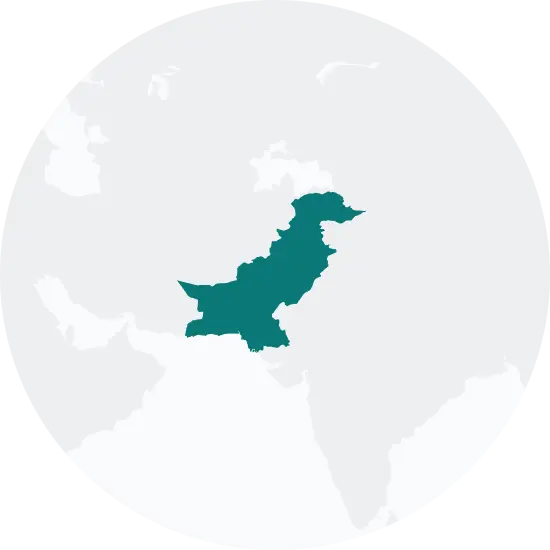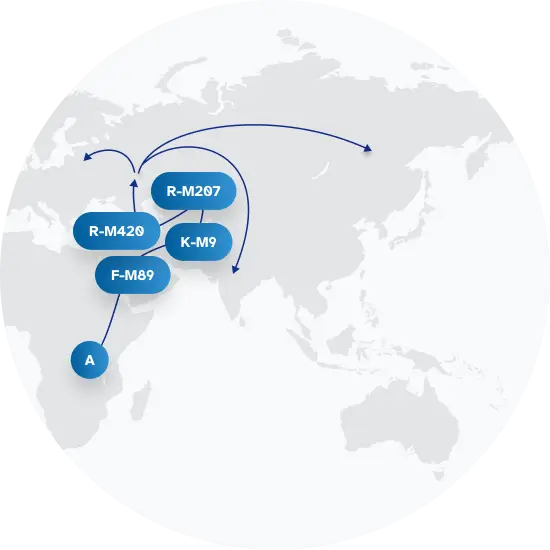Explore the Family Name Raja
How common is the last name Raja in the United States?
The surname "Raja" has seen a significant increase in popularity over the decade, according to data from the Decennial U.S. Census. In the year 2000, it was ranked 16,906 and by 2010, it had climbed up the ranks to the 12,035th position, marking an impressive rise of around 28.81%. The census also shows that the count of people with the surname Raja ballooned from 1,553 in 2000 to 2,593 in 2010 - a growth rate of almost 67%. Furthermore, the proportion of individuals with the Raja surname per 100k population increased by 51.72%, growing from 0.58 in 2000 to 0.88 in 2010.
| 2000 | 2010 | Change | |
|---|---|---|---|
| Rank | #16,906 | #12,035 | 28.81% |
| Count | 1,553 | 2,593 | 66.97% |
| Proportion per 100k | 0.58 | 0.88 | 51.72% |
Race and Ethnicity of people with the last name Raja
When it comes to ethnic identity, the Decennial U.S. Census data reveals interesting shifts between 2000 and 2010. Individuals identifying as Asian/Pacific Islander make up the majority of those with the surname Raja. This group saw an increase from 71.60% in 2000 to 85.08% in 2010, representing a change of 18.83%. On the other hand, the percentage of individuals with this surname who identify as belonging to two or more races saw a sharp decline of 75.38%, coming down from 14.42% to 3.55%. The proportion of White and Hispanic individuals with the name Raja also decreased by 18.64% and 17.23% respectively. The data for Black and American Indian and Alaskan Native were suppressed (S) for privacy reasons in the 2010 census.
| 2000 | 2010 | Change | |
|---|---|---|---|
| Asian/Pacific Islander | 71.6% | 85.08% | 18.83% |
| White | 10.62% | 8.64% | -18.64% |
| Two or More Races | 14.42% | 3.55% | -75.38% |
| Hispanic | 2.38% | 1.97% | -17.23% |
| Black | 0.52% | 0% | 0% |
| American Indian and Alaskan Native | 0.45% | 0% | 0% |
Raja ancestry composition
23andMe computes an ancestry breakdown for each customer. People may have ancestry from just one population or they may have ancestry from several populations. The most commonly-observed ancestry found in people with the surname Raja is Northern Indian & Pakistani, which comprises 51.7% of all ancestry found in people with the surname. The next two most common ancestries are Southern Indian & Sri Lankan (21.7%) and Southern Indian Subgroup (7.7%). Additional ancestries include British & Irish, French & German, Spanish & Portuguese, Bengali & Northeast Indian, and Peninsular Arab.
Ready to learn more about your ancestry? Get the most comprehensive ancestry breakdown on the market by taking our DNA test. Shop 23andMe
| ANCESTRY BREAKDOWN | COMPOSITION |
|---|---|
| Northern Indian & Pakistani | 51.7% |
| Southern Indian & Sri Lankan | 21.7% |
| Southern Indian Subgroup | 7.7% |
| Other | 18.9% |

Possible origins of the surname Raja
Your DNA provides clues about where your recent ancestors may have lived. Having many distant relatives in the same location suggests that you may all share common ancestry there. Locations with many distant relatives can also be places where people have migrated recently, such as large cities. If a large number of individuals who share your surname have distant relatives in a specific area, it could indicate a connection between your surname and that location, stemming from either recent ancestral ties or migration.
Based on 23andMe data, people with last name Raja have recent ancestry locations spanning a few countries, mostly in Pakistan, and India.
| RECENT ANCESTRY Location | Percentage |
|---|---|
| Punjab, Pakistan | 51.40% |
| Khyber Pakhtunkhwa, Pakistan | 25.70% |
| Tamil Nadu, India | 20.30% |
| Sindh, Pakistan | 16.20% |
| Azad Jammu And Kashmir, Pakistan | 14.90% |
What Raja haplogroups can tell you
Haplogroups are genetic population groups that share a common ancestor on either your paternal or maternal line. These paternal and maternal haplogroups shed light on your genetic ancestry and help tell the story of your family.
The top paternal haplogroup of people with the surname Raja is R-Y6, which is predominantly found among people with Central & South Asian ancestry. Haplogroup R-Y6 is descended from haplogroup R-M420. Other common haplogroups include R-Z93 and R-L266, which are predominantly found among people with Central & South Asian and Central & South Asian ancestry. Other surnames with similar common haplogroups are: Khan, Prasad, Hussain, Iyer, Malik, Shaikh, Akhtar, Ahmed, Siddiqui, Rao.
The most common maternal haplogroups of people with Raja surname are: M, U2_3_4_7_8_9, H. These most commonly trace back to individuals of European ancestry.
 Paternal Haplogroup Origins R-M420
Paternal Haplogroup Origins R-M420Your maternal lineage may be linked to Marie Antoinette
Because it is so dominant in the general European population, haplogroup H also appears quite frequently in the continent's royal houses. Marie Antoinette, an Austrian Hapsburg who married into the French royal family, inherited the haplogroup from her maternal ancestors. So did Prince Philip, Duke of Edinburgh, whose recorded genealogy traces his female line to Bavaria. Scientists also discovered that famed 16th century astronomer Nicolaus Copernicus traced his maternal lineages to haplogroup H.

What do people with the surname Raja have in common?
Spoiler alert: it's complicated. People with the same last name are usually no more genetically similar than a randomly sampled group of people from the same population. That said, people with the same surname are more likely to have similar ancestries than randomly sampled individuals. The reason is the tendency of people with similar cultural or geographical backgrounds to preferentially mate with one another. That's why people who share a surname may be more likely to share traits and tendencies in common than people within the general population. Check out the percentages below to see the prevalences of tastes, habits, and traits of people with your surname compared with prevalences among 23andMe users.
Preferences
Traits

Cheek Dimples
Small indentations that appear on the cheeks when a person smiles.
"Raja" Surname 52.9%
23andMe Users 37.6%
Habits

Sugary Drink
Drinks one or more sugary drinks per day.
"Raja" Surname 24.0%
23andMe Users 21.1%
Wellness

Migraine
A severe headache characterized by intense pain, sensitivity to light and sound, and often accompanied by nausea and vomiting.
"Raja" Surname 22.7%
23andMe Users 16.4%
Are health conditions linked to the last name Raja?
The short answer is that, if there is an association between surname and health, it's usually more about your ancestry than your name. Individuals with a given surname are no more genetically similar than the general population but often have similar ancestries. The populations of people associated with those shared ancestries often have sets of genetic variations, also known as alleles, in common. Some of those alleles are associated with a greater likelihood of developing certain diseases.
Disease variant frequency by ancestry
Disease allele frequencies in populations associated with the surname Raja are shown below. Important Note: not everyone with a disease allele will develop these health condition


